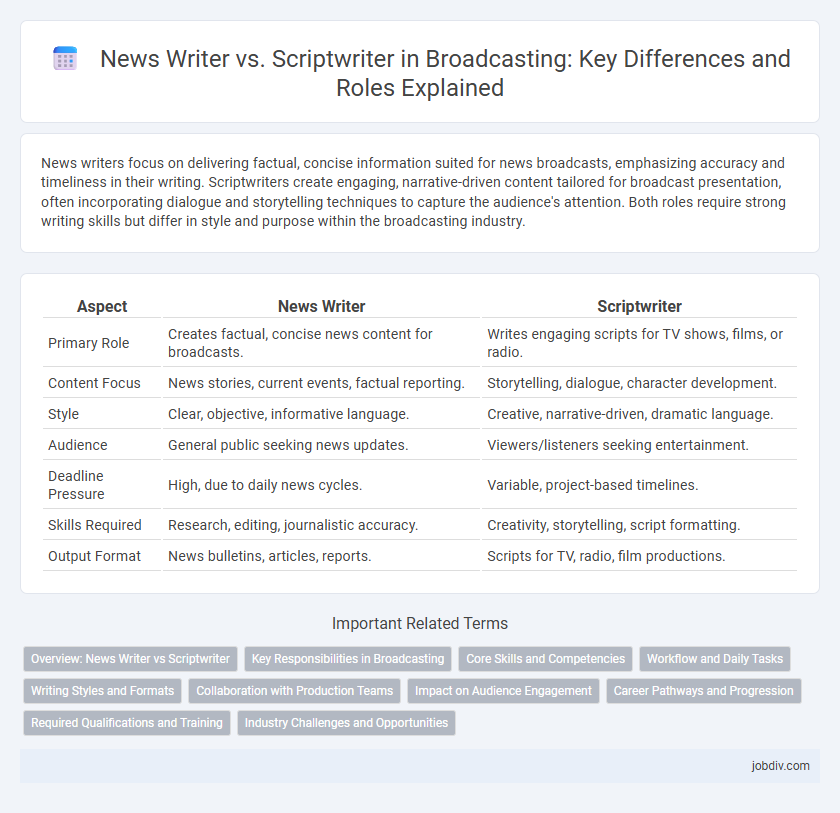News writers focus on delivering factual, concise information suited for news broadcasts, emphasizing accuracy and timeliness in their writing. Scriptwriters create engaging, narrative-driven content tailored for broadcast presentation, often incorporating dialogue and storytelling techniques to capture the audience's attention. Both roles require strong writing skills but differ in style and purpose within the broadcasting industry.
Table of Comparison
| Aspect | News Writer | Scriptwriter |
|---|---|---|
| Primary Role | Creates factual, concise news content for broadcasts. | Writes engaging scripts for TV shows, films, or radio. |
| Content Focus | News stories, current events, factual reporting. | Storytelling, dialogue, character development. |
| Style | Clear, objective, informative language. | Creative, narrative-driven, dramatic language. |
| Audience | General public seeking news updates. | Viewers/listeners seeking entertainment. |
| Deadline Pressure | High, due to daily news cycles. | Variable, project-based timelines. |
| Skills Required | Research, editing, journalistic accuracy. | Creativity, storytelling, script formatting. |
| Output Format | News bulletins, articles, reports. | Scripts for TV, radio, film productions. |
Overview: News Writer vs Scriptwriter
News writers focus on researching, gathering facts, and crafting accurate, concise news content for print, online, or broadcast media, emphasizing clarity and objectivity. Scriptwriters specialize in creating engaging scripts for television or radio broadcasts, including dramas, documentaries, or news segments, with attention to timing, narrative flow, and audience engagement. Both roles require strong writing skills but differ in content style, purpose, and target delivery format within the broadcasting industry.
Key Responsibilities in Broadcasting
News writers research, gather, and condense factual information to create clear, concise news stories for broadcast, ensuring accuracy and timeliness. Scriptwriters develop engaging, structured scripts tailored for on-air presentation, incorporating storytelling techniques and visual cues to enhance viewer understanding. Both roles collaborate closely to deliver coherent and compelling broadcast content that meets editorial standards and audience expectations.
Core Skills and Competencies
News writers excel in researching, verifying facts, and crafting concise, accurate articles under tight deadlines, ensuring clarity and factual integrity for broadcast journalism. Scriptwriters specialize in storytelling, dialogue creation, and pacing, tailoring scripts to fit visual and auditory cues while engaging the target audience effectively. Both roles require strong communication skills, attention to detail, and adaptability, but news writers emphasize factual accuracy while scriptwriters focus on narrative flow and emotional impact.
Workflow and Daily Tasks
News writers primarily research, gather information, and craft clear, concise news articles based on the latest events, adhering to tight deadlines and fact-checking protocols. Scriptwriters focus on developing engaging and structured scripts for broadcasts, transforming news content into readable dialogue that suits on-air delivery, including timing and tone adjustments. Both roles require collaboration with editors, producers, and anchors to ensure accurate, coherent, and timely news presentations.
Writing Styles and Formats
News writers prioritize concise, factual reporting using the inverted pyramid structure to deliver timely information efficiently. Scriptwriters craft narratives with dialogue, scene directions, and pacing tailored to visual or auditory storytelling formats such as television or radio broadcasts. News writing emphasizes clarity and objectivity, while scriptwriting focuses on engaging the audience through dramatic and narrative techniques.
Collaboration with Production Teams
News writers collaborate closely with production teams to ensure accurate and timely content delivery, often providing real-time updates and verified facts. Scriptwriters work alongside directors, producers, and editors to craft engaging narratives that align with the visual and auditory elements of broadcasts. Both roles require strong communication skills and adaptability to meet the fast-paced demands of live and recorded news programming.
Impact on Audience Engagement
News writers craft concise, fact-driven articles that deliver timely information, fostering audience trust and credibility through clarity and accuracy. Scriptwriters develop compelling narratives for broadcasts, utilizing storytelling techniques and emotional appeal to captivate viewers and maintain their interest throughout the program. Both roles significantly influence audience engagement by balancing informative content with engaging presentation tailored to the medium.
Career Pathways and Progression
News writers typically begin their careers in journalism or media studies, gaining experience through internships and entry-level reporting roles before advancing to editorial positions or senior writing jobs. Scriptwriters often start with formal training in creative writing or film and television production, building their portfolios through freelance projects and gradually moving into staff writing or producer roles. Both career pathways demand strong storytelling skills and an understanding of audience engagement, with progression dependent on versatility, industry networking, and the ability to adapt to evolving media formats.
Required Qualifications and Training
News writers typically require a degree in journalism, communications, or related fields, with strong skills in researching, writing, and fact-checking under tight deadlines. Scriptwriters often hold qualifications in creative writing, media production, or film studies, emphasizing narrative development, dialogue creation, and understanding of production processes. Both roles benefit from internships or hands-on training in broadcasting environments to develop industry-specific skills and adapt to evolving content delivery platforms.
Industry Challenges and Opportunities
News writers in broadcasting face tight deadlines and the need for accuracy under pressure, requiring rapid information gathering and verification. Scriptwriters must balance creativity with clarity, crafting engaging narratives that align with the station's tone while accommodating time constraints. Both roles encounter challenges from evolving digital platforms but gain opportunities through multimedia storytelling and audience analytics to enhance content impact.
News Writer vs Scriptwriter Infographic

 jobdiv.com
jobdiv.com